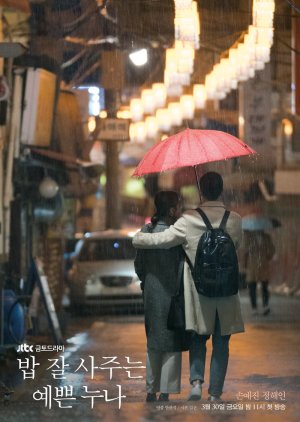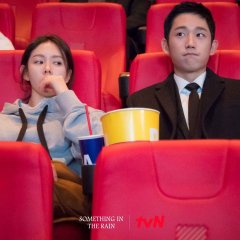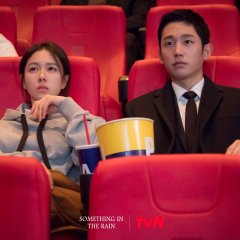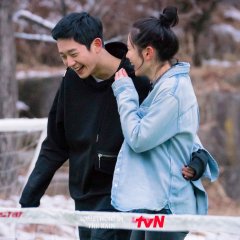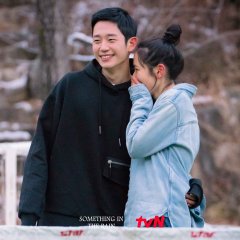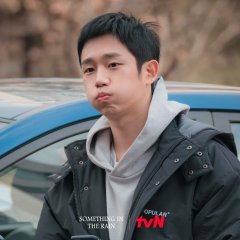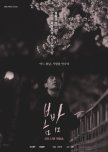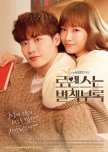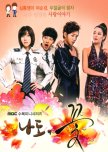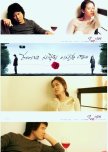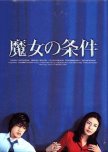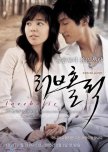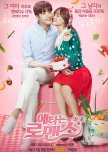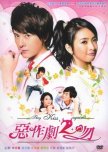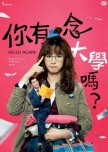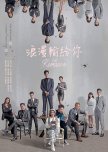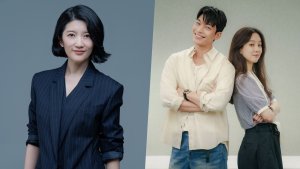 Jang So Yeon is confirmed to star alongside Wi Ha Joon and Jung Ryeo Won in a new K-drama
Jang So Yeon is confirmed to star alongside Wi Ha Joon and Jung Ryeo Won in a new K-drama După ce îl reîntâlnește pe fratele mai mic al unei prietene, întors după o perioadă în străinătate, o femeie de carieră, recent despărțită, îl vede într-o nouă lumină. (Sursă: Netflix) Editează Traducerea
- Română
- Arabic
- Русский
- English
- Titlu Nativ: 밥 잘 사주는 예쁜 누나
- De asemenea cunoscut ca și: Bab Jal Sajooneun Yebbeun Noona , Pretty Noona Who Buys Me Food , Pretty Sister Who Buys Me Food , Something in the Rain
- Regizor: Ahn Pan Seok
- Scenarist: Kim Eun
- Genuri: Afaceri, Romantism, Viaţă, Melodramă
Cast și credite
- Son Ye JinYun Jin ARol Principal
- Jung Hae InSeo Jun HuiRol Principal
- Jang So YeonSeo Gyeong Sun [Jin A's best friend / Jun Hui's sister]Rolul de Sprijin
- Jung EugeneKang Se Yeong [Jin A's colleague]Rolul de Sprijin
- Lee Joo YoungLee Ye Eun [Jin A's colleague]Rolul de Sprijin
- Lee Hwa RyongGong Cheol Gu [Team manager]Rolul de Sprijin
Recenzie

“I fell in love the way you fall asleep: slowly, then all at once”.
For me, this sums up most of this drama. It is watching two people slowly and then passionately fall in love with one another. The doubting if the other feels the same, the awkwardness of new love, the heart fluttering moments, and everything in between. The realism, chemistry, and gradual buildup of the relationship in the story was unlike anything I have ever experienced. It was reminiscent of the director, Ahn Pan Seok’s, previous work Secret Love Affair. Except this is less about two lost souls finding one another and more of a story of realizing the right person was someone you knew all along. Brilliant in its subtleties, this was a true example of a slow-paced romantic melodrama.
However, despite this drama’s strong beginnings, the middle could best be described as lukewarm. Muddled with repetitive plot scenarios that take far too long to resolve, around episode 9 this drama started to feel almost like a chore to watch. The chemistry was still there but the spark was missing, making what could have been my favorite romance of all time, one that I found myself barely making it to its conclusion. But despite its faults, this drama still deserves a solid 8, because it’s first 6 to7 episodes literally had ME feeling butterflies. I even wanted to tell random passersbys to watch this drama if they want to FEEEEEL what it is like for two people to fall in love. I did not think it was possible for me to feel so strongly about a drama, and for this it deserves the 8.
Overall, I recommend it, but mostly the first nine episodes. After that, you could probably skip to the finale and be just as satisfied.
Considerați utilă această recenzie?

unterwegsimkoreanischenD
79 oamenii au considerat această recenzie utilă
Down to earth romance, providing troubling insight on what South Korean women are facing these days
"Something in the Rain" is a love story about an older woman (35) with a younger man (about 24). Yet, above all, the KDrama is a critical social study about relationship taboos and parental respect in South Korea as well as sexism in the workplace. Authentic. Bitter. Sweet.The original title of the KDrama "Pretty Nuna, who invites me to dinner" contains the taboo relationship with all its dynamics on which the story is based - the woman is older (´nuna´) than her boy friend (a no-go!)..., and still being a sucessful employee she earns good money instead of being married (another no-go). Actually in South Korea this is a serious problem of a recent generation gap and gender conflict.
Just consider the significance of "Something in the Rain" (as the romance that it is) in such a broader sense. If you are missing a special icing throughout the story, than this is simply what it is. It is supposed to. Overall, I consider "Something in the Rain" a rather up to date, down to earth, authentic romance, providing troubling insight what kind of circumstances South Korean women (and men) are facing these days.
--------------------- SIDE NOTE --- South Korean women and romance in everyday day life
In relation to everyday life in South Korea the focus on romance and true love in KDrama takes on a whole new meaning. Very few people really have time for a relationship during their professional life. The working days are long. In addition, women are discriminated against at work, sexualized and reduced to their gender role. They work harder (and often more efficiently) than their male counterparts, but are paid less and are less likely to be promoted, as they are bound to get pregnant soon. If they really do get pregnant, then that's it for professional life. Child care for 70-80 workhour weeks (with commuting and company dinners) is hardly affordable. Women do not have to hope for flexible working hours from their employer. So women with children inevitably end up at the stove. Women can forget about returning to work.
As a daughter, women already have a difficult time in the family. If they are married, then first of all they have to relieve the elders - in both families. (If they are not married, they are blamed or rushed oder pushed to quickly do so). Men, on the other hand, are celebrated by families as sons from the start. Accordingly, they present themselves in public with self-confidence and appear more macho. It's not uncommon for them to loudly and rudely gossip about the looks of women in the coffee shop or restaurant or shop or at work or in public. (Actually with the job market being extremely competitive, the appearance of women can not only decide about the partner, but also about the employment).
There are numbers from surveys showing that on average, seven out of ten South Koreans don't have time to date and only about four out of ten are in a committed relationship. The work is more important. Not necessarily because they identify with it so much, but because they don't want to lose it. The pressure to perform is enormous for everyone. As a result, 3/4 of South Korean women between the ages of 25 and 29 are not yet married. Among women between the ages of 30 and 34, more than half are still unmarried. South Korean women also have increasingly modern demands for a self-determined life. They are less and less interested in macho men and suffocating family structures that reduce them to rasing children, representation and the home. This is also due to the fact that normal households can hardly cover their expenses. Family costs money. Divorce rates are rising (South Korea is having one of the highest in the world), yet women are finding it difficult to return to work. There is also a stigma to living as a single parent. (Accordingly, these days not only unmarried couples, but also married couples are less likely to have children.)
Society is in a dilemma. In fact, it can't help but modernize its patriarchal, women-discriminating value systems if it wants to survive. The South Korean population will otherwise shrink under the given circumstances from 2027 onwards. (Update 30.7.22: Statistics Korea reports on 28. July 2022 first time shrinking in 2021 already...)
Considerați utilă această recenzie?

